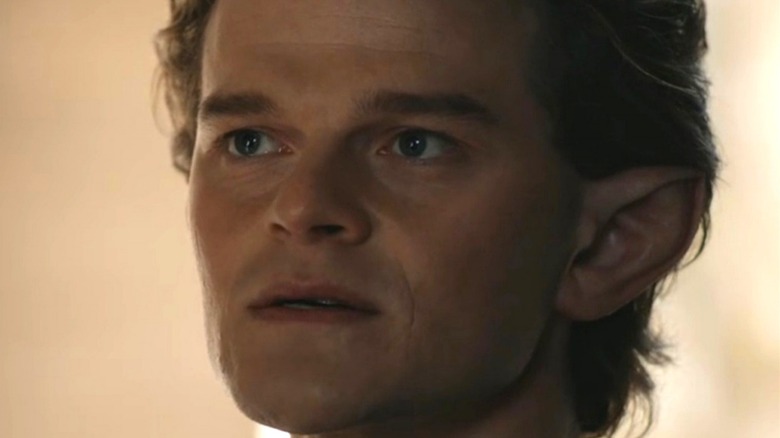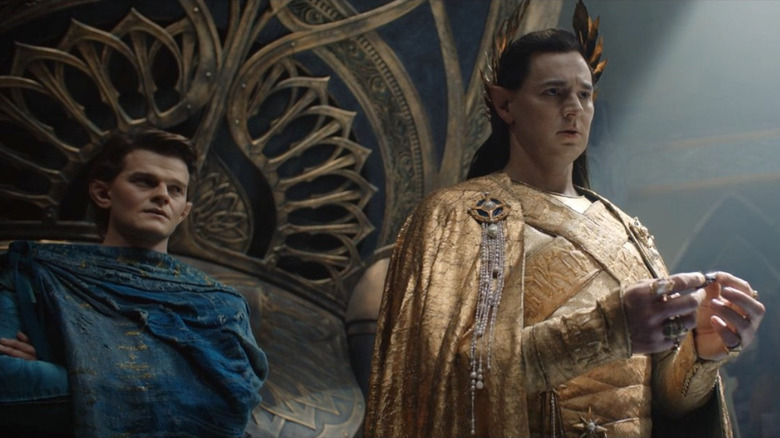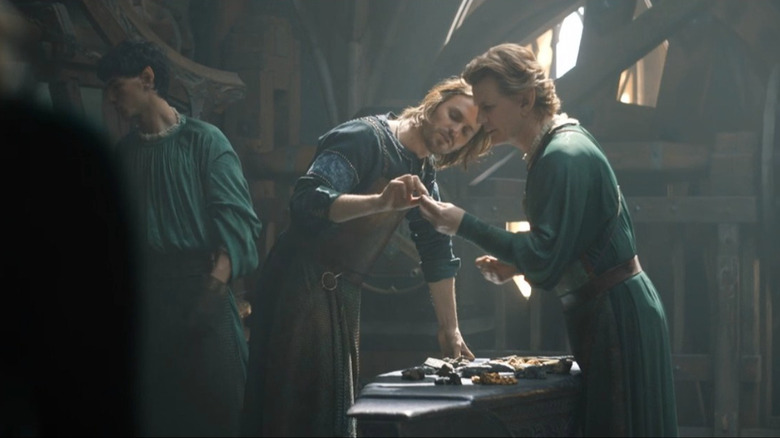How Elrond Might Have Saved The Future Of Middle-Earth In The Rings Of Power Season 1 Finale
Contains spoilers for "The Lord of the Rings: The Rings of Power" Season 1
Every action in every story is critical to the final outcome. This butterfly effect is utilized by countless time-travel movies, but who says the concept of small changes having a larger impact is something exclusively reserved for sci-fi? It plays into every story, including those that take place in J.R.R. Tolkien's Middle-earth. In fact, Tolkien's take on fate, destiny, and a higher power is well documented. The author was a devout Catholic, and his religious background led him to infuse his world with an all-encompassing concept that everything is always under control.
At times, it's fun to take these ideas of a higher power and a butterfly effect and consider how they impact things in Tolkien's highly intricate world. For instance, if Bilbo isn't sitting outside on a pleasant morning, he never meets Gandalf. That same Hobbit accidentally finds a ring when crawling through a mountain pass. Frodo doesn't kill Gollum, only to be saved by his treachery at the Cracks of Doom. Everywhere you look in Tolkien's writings, the little events play a crucial role in the final outcomes.
It's a fact that is even true when others are at the creative tiller. Take, for instance, a scene in the final episode of the first season of "The Lord of the Rings: The Rings of Power," when Elrond (Robert Aramayo) begs his High King Gil-galad (Benjamin Walker) to give him three more months to find a way to stop the Elves from leaving Middle-earth. The monarch grants this boon, giving his Herald enough time to rally the troops and find a solution. We're willing to say this isn't just a close call. It is a crucial moment that connects to Sauron's downfall thousands of years later.
Elrond's stubbornness indirectly saves Middle-earth
Let's take a look at the facts here. In "The Lord of the Rings: The Rings of Power," the Elves are desperate for a way to rejuvenate their tired souls, and if they don't find it, they will need to leave Middle-earth for good. In fact, when they fail to obtain more mithril, Gil-galad literally tells his followers to pack up shop and head for the shores. It isn't a suggestion — it's an order. The gig is up, guys. We've failed. The Elves will leave Middle-earth to the machinations of Sauron and his servants. The end. Game over.
But then Elrond convinces the High King to give them a little more time, time that they use to finally crack the case of the fading Elves by spring by making the Three Elven Rings. Okay, but Sauron is just going to make the One Ring and take over anyway, right? Precisely. See, in the case of both "The Rings of Power" and Tolkien's original stories, the creation of the Rings of Power themselves isn't just important. It's the reason the good guys can eventually take down Sauron in "The Lord of the Rings," thousands of years later. No, seriously. Without the creation of the Rings of Power, it's difficult to see how Sauron is ever defeated, let alone twice at the end of the Second and Third ages.
Sauron ties his fate to the One Ring
At the beginning of "The Fellowship of the Ring," Gandalf the Grey explains the situation to Frodo, laying out the stakes and giving the terrified little Hobbit an idea of just how big of a story he fell into when he inherited his cousin's magic ring. At one point, the Wizard says, "He only needs the One; for he made that Ring himself, it is his, and he let a great part of his own former power pass into it, so that he could rule all the others." In other words, Sauron sacrificed a significant part of his internal power potency by pouring it into his Ring. This turns that bauble into a super-powered tool that he can use to control others ... but it also creates a chink in his armor.
How? Because the Dark Lord becomes tied to the fate of the Ring as an extension of himself. In fact, in "The Return of the King" book, Gandalf describes Sauron's doom if the One Ring should be destroyed, saying that "he will lose the best part of the strength that was native to him in his beginning, and all that was made or begun with that power will crumble, and he will be maimed for ever, becoming a mere spirit of malice that gnaws itself in the shadows, but cannot again grow or take shape."
So, if it weren't for the One Ring, Sauron would remain nearly invincible. And he wouldn't make that Ring if he weren't angling to dominate the other Rings of Power — especially the Three Elven Rings. And, in "The Lord of the Rings: The Rings of Power," those rings wouldn't exist without Elrond's last-ditch appeal for more time. See? It all comes together.


